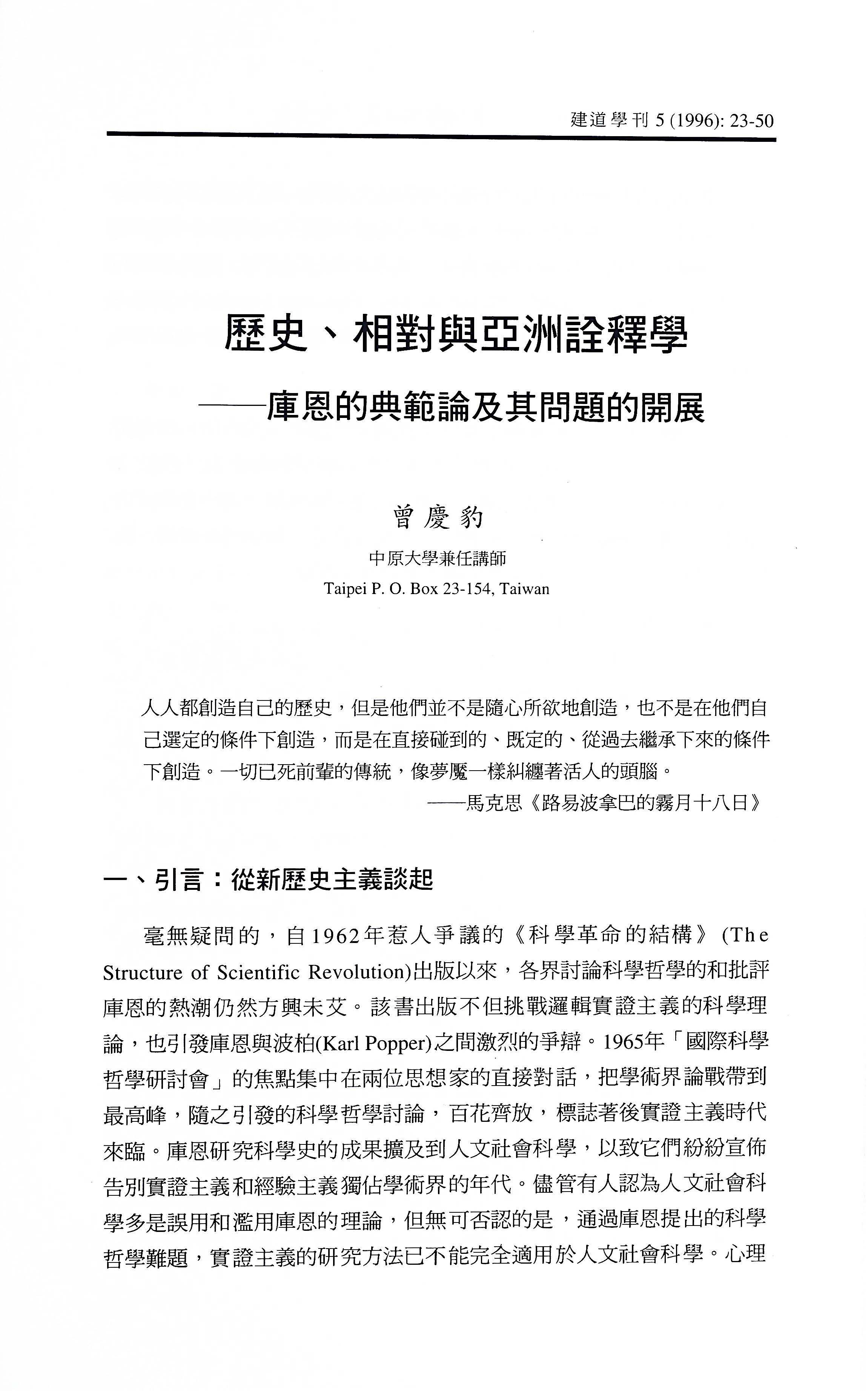歷史﹑相對與亞洲詮釋學——庫恩的典範論及其問題的開展 / 曾慶豹
撮要
當代各種人文社會科學的研究,都強調了「歷史」的作用,而「歷史化」最易引人誤會為「相對化」。本文以科學哲學家庫恩(Thomas Kuhn)的典範論 (Paradigms)為核心來討論亞洲詮釋學,分別說明在詮釋學上客觀和相對的超越, 以及不同的典範和典範間的不可共量性(incommensurability)。前者認為亞洲詮釋學在關於真理或知識的討論與客觀或相對與否無關,這意謂著多樣的互動帶來對真理開放;後者則指出把亞洲詮釋學視為方法操作的此路不通;相反的,在歷史的作用下,只有存有論(ontological)意義的亞洲詮釋學而沒有方法論 (methodological)的亞洲詮釋學。所以,種種在詮釋學前提上的所謂詮釋的衝突, 都可以看作是意識形態的衝突。我們的結論認為,亞洲詮釋學事實上是一個吊詭的概念,通過我們逐一檢討基督教在華人生活世界所展開的種種詮釋學立場:二元論、民族論、本土論,其所得的結果是相同的,就是所謂的「詮釋的弔詭」
ABSTRACT
Contemporary humanities and social sciences emphasize the function of history, but historicity can be misunderstood as relativity. This paper seeks to use the philosopher Thomas Kuhn’s paradigm to discuss Asian Hermeneutics, explaining its scope as stretching beyond objectivity and relativity in hermeneutics. It also discusses the incommensurability between various paradigms. Asian Hermeneutics have no relation with objectivity and relativity as far as truth and knowledge are concerned. This implies the need for openness to truth initiated by various interactions. Asian Hermeneutics may be seen as methodologically implausible, because under the function of history, Asian Hermeneutics have only ontological meaning; they are not methodological. Therefore, conflicting hermeneutical presuppositions are in fact a conflict of ideology. The paper will then provide appraisals of Christian hermeneutics in the Chinese life-world concerning “dualism”, “ethnicity” and “indigenous”, and hermeneutical paradox is usually the common conclusion.
原載於《建道學刊》5期(1996年1月),頁23-50。
Latest Articles
新手牧者研究計劃(三):新手牧者的身心靈狀態 / 盧慧儀
2025 年 11 月 19 日
個體與關係:滕近輝思想中「深化」的靈性觀 / 倪步曉
2025 年 11 月 18 日
香港九龍塘基督教中華宣道會之起源和發展史/陳智衡
2025 年 10 月 20 日
Highlights
[電子書]困境與抉擇:「建道研究中心30週年誌慶」跨學科研討會論文集/廖炳堂、倪步曉主編
2025 年 1 月 2 日
從梧州到長洲:建道神學院125年的挑戰與恩典 / 陳智衡
2023 年 10 月 1 日
微小教會的見證/高銘謙
2023 年 6 月 1 日







